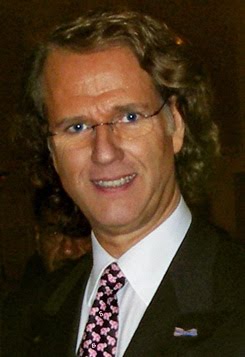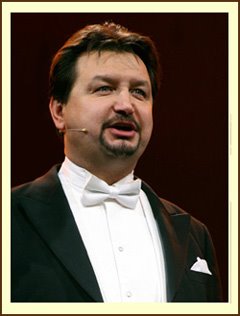A crew of 50 people, consisting of technicians, stage- and décor builders; 60 members of the orchestra and choir as well as 4 sets of decor, instruments and costumes travel across the world.
 André sits in the Lotus position in
the window sill of the Hilton Hotel's presidential suite in São Paulo,
where he landed with his entire crew consisting of 110 people. "Everyone
deserves a good bed, Wi-Fi to connect with home via social media, good food and
medical care. We have breakfast and lunch in the hotel, have our own chefs prepare the
dinner in the stadium and have a doctor travelling with us. We travel 160
days of the year. Then you have to make sure of your comfort. That is our way of
life."
André sits in the Lotus position in
the window sill of the Hilton Hotel's presidential suite in São Paulo,
where he landed with his entire crew consisting of 110 people. "Everyone
deserves a good bed, Wi-Fi to connect with home via social media, good food and
medical care. We have breakfast and lunch in the hotel, have our own chefs prepare the
dinner in the stadium and have a doctor travelling with us. We travel 160
days of the year. Then you have to make sure of your comfort. That is our way of
life." Rieu turned 65 on the airplane en route to São Paulo. "This age does not mean anything to me. I have a free profession; I will continue until I die. In any case, nowadays 65 is what 55 used to be. My personal trainer, Ruud, travels with us and I work out every other day. He and the doctor keep a close watch on my health. No, fortunately I got rid of the virus which kept me from working for several months. Everything is okay now. But I don't do silly things any more. This lifestyle is similar to that of top sportsmen."
In his suite there is a treadmill, weights and mats on the floor in front of the gigantic windows which overlooks the famous hanging bridge of São Paulo. André Rieu speaks openly about his life on tour: "During such a tour I hardly leave my hotel room, except to perform. I sleep, have breakfast, work out, eat, sleep again, go to a performance, the sound check, eat, sleep again, the big performance, receive guests, sleep..... and that has now been the routine for the past 9 days."
When André leaves his hotel in the afternoon to go to the concert venue, the Estádio (stadium) in the Iberpuero quarter, we witness the extent of the Limburg Waltz King’s popularity in South America. Everywhere there are fans who would like to have a photo taken with him. About ten impressively armed motorcycle police officers, who escort him through the traffic, assist in organizing the photo shoots. Later on they stop the traffic and smoothly guide the buses through the enormous traffic jams which are a daily occurrence in a city with 22 million inhabitants.
 Limburger Frans Neus and his team are
responsible for the organization of the tours. He maintains contacts with
authorities and local promoters. "São Paulo is a crazy city. Skyscrapers as far
as you can see and in between ... slums. It is not safe to walk the streets
by yourself. We are grateful for the support of the police. A 32 minute drive to
the airport could easily take 5 hours without their help." Outside the arena
Frans points to about 15 helicopters, circling like dragonflies above this part
of the city. "They transport businessmen who hop from heli platform to heli
platform on the roofs of the skyscrapers. It saves time and is safer. São Paulo
is the financial and economic heart of Brazil."
Limburger Frans Neus and his team are
responsible for the organization of the tours. He maintains contacts with
authorities and local promoters. "São Paulo is a crazy city. Skyscrapers as far
as you can see and in between ... slums. It is not safe to walk the streets
by yourself. We are grateful for the support of the police. A 32 minute drive to
the airport could easily take 5 hours without their help." Outside the arena
Frans points to about 15 helicopters, circling like dragonflies above this part
of the city. "They transport businessmen who hop from heli platform to heli
platform on the roofs of the skyscrapers. It saves time and is safer. São Paulo
is the financial and economic heart of Brazil." At the stadium the corridors are filled with André Rieu travel containers – proof that the Maastricht maestro has really taken over the stadium. In the venue you may also notice the difference between poor and rich. Downstairs, on the field, are hundreds of stylishly padded seats for the upper economic classes. In other parts of the arena are plastic seats for the Brazilians who, for most of the time, had to save money for months in order to be able to buy a concert ticket.
Frans tells us that the stadium has improved a lot. "They would like for us to return in December 2015. That will be in their summer. We mentioned air-conditioning as a prerequisite for that. Currently it is spring and we already have to perform in 35 degrees Celsius. They agreed immediately. But we will have to reconsider that carefully, since we usually perform in the UK in December."
 In 2013, the first year that André Rieu performed
in Brazil, 180,000 tickets were sold. A short tour was added this year, with 60,000 tickets being sold. When the show begins at 9 PM, Rieu fever breaks out.
Cheering Brazilians chant his name when André and his orchestra, dressed in
baroque costumes, enter from the catacombs. A Brazilian lady is wiping away a
tear: "Tonight my dream comes true. Are you from Holland? André Rieu is as
fabulous as Johan Cruijff."
In 2013, the first year that André Rieu performed
in Brazil, 180,000 tickets were sold. A short tour was added this year, with 60,000 tickets being sold. When the show begins at 9 PM, Rieu fever breaks out.
Cheering Brazilians chant his name when André and his orchestra, dressed in
baroque costumes, enter from the catacombs. A Brazilian lady is wiping away a
tear: "Tonight my dream comes true. Are you from Holland? André Rieu is as
fabulous as Johan Cruijff." André smoothly performs his program on stage. He invites the audience to waltz to the Blue Danube. The Brazilians don't hesitate for a moment. Within five seconds the aisles are filled with dancing couples. The cameraman notices a lovely older couple dancing somewhere far above. The images are shown on the big screens and the audience goes wild. The Samba is forgotten; the Waltz reigns.
The next morning, in his suite, André refers to the discovery of South America as incidental. "We often performed in North America and once in El Paso (Texas) near the Mexican border. To venture across the border seemed logical. To our astonishment we were hugely successful over there. Now we perform everywhere in South America: Buenos Aires in Argentina, Santiago de Chile, Belo Horizonte, Rio de Janeiro, and São Paulo in Brazil. In the meantime we have the entire world on our program: New Zealand, Australia, Japan." He says laughingly that "The Japanese people are not good at waltzing. They hop up and down in similar fashion to the "Teletubbies." The Chinese people can waltz. We have just been to Taiwan by invitation and then we also performed in China. That is not yet profitable for us, but I would like to conquer this part of the world as well; maybe next year."
He murmurs to himself and for the first time I notice how dead silent his hotel suite is; no softly playing violin ensemble, nor any other background music. Is that incidental? "You are right", he says pondering. "Outside of my job I never listen to music, because I do not find it relaxing. Music touches me too much. I always give an opinion or would like to re-arrange. Listening in a relaxed way is not possible for me. That is probably the only disadvantage of my profession."
FRANK STEIJNS: the bell player of São Paulo
Frank Steijns is one of the violinists of the Johann Strauss Orchestra. Frank is also a carillonist and is very fond of carillons: "It is our national instrument." Frank discovered a basilica with a neglected carillon in Sao Paulo, which was put there a long time ago by two Dutch monks. "It had seized up completely and was played for the last time in 1962. I supported the renovation and the Brazilians did not know what they were hearing when I touched the bells for the first time. We have now devised a plan to educate a Brazilian musician to play the bells; and that is how André and the Johann Strauss Orchestra bring back music to the churches."
André Rieu has two sons. Pierre is in the company and is partly responsible for his father's triumphs. André says: "I dream and he makes it possible." Marc is a painter and he joined the group with his paintings in shipping containers. During the first tour to Brazil, he sold all 17 of his paintings. This year he sold 13. Just like the real Dutch Masters, he specializes in cloudy skies.
Translation by Ineke and
Entia








































































































































2 comments:
Yeahhh!! Great article. Thank you Sue, you create a wonderful lay-out with beautiful pictures!!
Ineke.
J'adore cet article. André ou qu'il aille rencontre un succès à la mesure de son immense talent, cet homme est tout simplement génial et sa musique est un vrai bonheur à écouter. A 65 ans, il est encore très jeune et tout son public espère qu'il continuera le plus longtemps possible à apporter la joie autour de lui. Merci et GOD BLESS YOU, Maestro ! Francine.
Post a Comment